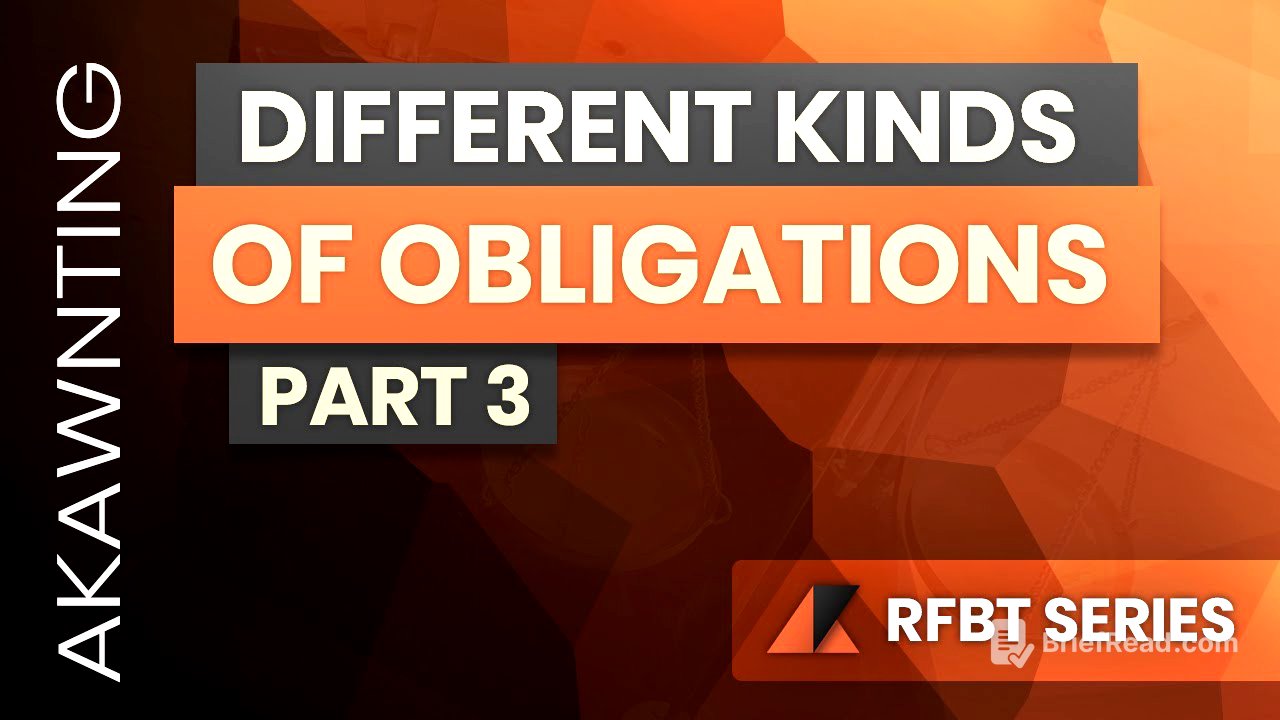TLDR;
This video provides a detailed explanation of different kinds of obligations based on the Civil Code, specifically Articles 1199 to 1233. It covers alternative, facultative, joint, and solidary obligations, as well as divisible and indivisible obligations, and obligations with a penal clause. The video uses examples to illustrate key concepts and rules, making it easier to understand the complexities of each type of obligation.
- Alternative and Facultative Obligations
- Joint and Solidary Obligations
- Divisible and Indivisible Obligations
- Obligations with a Penal Clause
Introduction [0:00]
The video introduces the third part of a series discussing different kinds of obligations based on the Civil Code Article 1199 and 1233. It encourages viewers to subscribe for updates on upcoming videos and to like the video if they find it helpful. The video also mentions a link where viewers can test their understanding of the topics discussed.
Alternative Obligations [2:42]
The discussion begins with alternative obligations, which are classified according to the number of prestations. A simple obligation involves only one prestation, while a compound obligation involves two or more. Compound obligations can be conjunctive, requiring the fulfillment of all prestations, or alternative, where fulfilling only one prestation extinguishes the obligation. Article 1199 states that a person alternatively bound by different prestations must completely perform one of them, and the creditor cannot be compelled to receive parts of different undertakings. Article 1200 specifies that the debtor has the right of choice unless expressly granted to the creditor, but the debtor cannot choose impossible or unlawful prestations.
Examples of Alternative Obligations [6:05]
Gerald promises to deliver one of three specific PC sets to Rent Free. Fulfilling any one of these options extinguishes the obligation. Rent Free cannot compel Gerald to deliver components from different PC sets. If one of the prestations becomes impossible or unlawful, the debtor loses the right to choose that prestation, as per Article 1200.
Communication of Choice and Loss of Right [9:23]
Article 1201 states that the choice of prestation takes effect only upon communication. Once Gerald communicates his choice to Rent Free, the alternative obligation becomes a simple obligation. If one of the options becomes impossible, Gerald must choose from the remaining valid options. Article 1202 states that the debtor loses the right of choice when only one prestation is practicable.
Loss of Items and Creditor's Fault [13:19]
If all prestations become impossible or unlawful, the obligation is void. However, if the loss is due to a fortuitous event, the obligation may remain alternative if other options are available. Article 1203 states that if the debtor cannot make a choice due to the creditor's acts, the debtor may rescind the contract with damages.
Debtor's Fault and Creditor's Choice [20:21]
If the loss of an item is due to the debtor's fault, Article 1204 applies, and the debtor must pay the value of the last thing lost plus damages. Article 1205 discusses scenarios where the choice belongs to the creditor. In such cases, the obligation ceases to be alternative once the selection is communicated to the debtor. The rules for loss or impossibility vary depending on whether the choice belongs to the debtor or the creditor.
Rules When Choice Belongs to Creditor [25:42]
When the choice belongs to the creditor, if one item is lost due to a fortuitous event, the creditor can choose from the remaining items. If the loss is due to the debtor's fault, the creditor can claim any of the subsisting items or the price of the lost item with damages. If all items are lost due to the debtor's fault, the creditor can demand the price of any of them with indemnity for damages.
Facultative Obligations [32:41]
A facultative obligation involves only one prestation, but the debtor may render another in substitution. Article 1206 defines this type of obligation. The loss or deterioration of the intended substitute does not make the debtor liable, but once the substitution is made, the debtor is liable for any loss of the substitute due to delay, negligence, or fraud.
Examples and Rules for Facultative Obligations [34:10]
Gerald promises to deliver a specific laptop to Turin Free but stipulates that he may deliver a specific tablet as a substitute. The active prestation at any given moment is only one. The substitution triggers a change in the active prestation. Before answering problems, identify if a substitution was already made. If the loss or deterioration of the principal prestation happens before substitution, the debtor is liable if he is the cause of the loss. If it happens after substitution, the debtor is liable even if he is not the cause.
Key Differences and Joint and Solidary Obligations [45:05]
The key differences between alternative and facultative obligations are highlighted. Alternative obligations involve two or more prestations with the right of choice belonging to either the debtor or creditor, while facultative obligations involve only one prestation with the right of substitution belonging only to the debtor. The legality or impossibility of one prestation in an alternative obligation does not invalidate the whole obligation, but in a facultative obligation, it does. The video then transitions to joint and solidary obligations, focusing on the number of parties involved.
Joint and Solidary Obligations Explained [46:46]
Joint and solidary obligations concern the number of active or passive subjects (creditors and debtors). Article 1207 states that the concurrence of multiple creditors or debtors does not imply that each has the right to demand or is bound to render entire compliance, unless the obligation expressly states solidarity or the law/nature of the obligation requires it. Article 1208 states that the credit or debt shall be presumed to be divided into as many shares as there are creditors or debtors.
Rules and Examples of Joint and Solidary Liabilities [51:11]
In a solidary obligation, each creditor has the right to collect the entire obligation, and each debtor is obliged to pay the entire amount. In a joint obligation, each creditor can only demand their share, and each debtor is only liable for their share. The video provides examples to illustrate these concepts, including scenarios with multiple creditors and debtors.
Joint vs. Solidary: Liability and Collection [55:22]
The video presents a scenario where A, B, and C are bound to pay X, Y, and Z 9,000 pesos. It explains how to determine the share of each debtor and creditor, and how much each party is liable to pay or can collect, depending on whether the obligation is joint or solidary.
Solidary Creditors and Joint Debtors [1:02:11]
The video explores a scenario where A, B, and C are jointly bound to pay solidary creditors X, Y, and Z. It explains how the rules change when the creditors are solidary but the debtors are joint, affecting the amount each party can collect or is liable to pay.
Solidary Obligations on Both Sides [1:11:09]
The video discusses a scenario where both debtors and creditors are solidary. It explains that in such cases, any debtor is liable to pay the entire amount to any creditor, and any creditor can collect the entire amount from any debtor.
Joint Indivisible Obligations [1:15:19]
Article 1209 discusses joint indivisible obligations, where the obligation cannot be divided. The right of the creditors may be prejudiced only by their collective acts, and the debt can be enforced only by proceeding against all the debtors. If one debtor is insolvent, the others are not liable for his share.
Indivisibility and Solidarity [1:19:47]
The video clarifies that the indivisibility of an obligation does not necessarily give rise to solidarity, nor does solidarity imply indivisibility. These are distinct characteristics. Solidarity may exist even if the creditors and debtors are not bound in the same manner or by the same conditions.
Solidarity with Different Terms and Actions [1:20:47]
Article 1211 is explained with an example where A, B, C, and D are obliged in solidarity to pay E 20,000 under different terms. A pays in installments, B is required to pay by September, and C is conditional upon passing the bar exam. Each solidary creditor may do what is useful to others but not anything prejudicial.
Assignment and Payment in Solidary Obligations [1:27:23]
A solidary creditor can assign his right without the consent of others. The debtor may pay any one of the solidary creditors, but if one has made a judicial or extrajudicial demand, payment should be made to him.
Extinguishment and Solidarity [1:29:34]
Novation, compensation, confusion, or remission of the debt made by any of the solidary debtors or creditors extinguishes the obligation. The creditor who executed any of these acts or collects the debt is liable to the others for their corresponding share.
Legal Recourse and Fortuitous Events [1:30:32]
The creditor may proceed against any one of the solidary debtors or some or all of them simultaneously. A demand made against one does not prevent subsequent demands against others until the debt is fully collected. Payment by one solidary debtor extinguishes the obligation. If two or more offer to pay, the creditor may choose which offer to accept.
Insolvency and Reimbursement [1:34:06]
The debtor who made the payment may claim from his co-debtors only the share that corresponds to each, with interest for the payment already made. If one of the solidary debtors cannot reimburse due to insolvency, his share shall be borne by all the other co-debtors in proportion to their debts.
Prescription and Remission [1:38:42]
Payment by a solidary debtor does not entitle him to reimbursement from his co-debtors if such payment is made after the obligation has prescribed or becomes illegal. The remission made by the creditor of the share that affects one of the solidary debtors does not release the latter from his responsibility toward the co-debtors if the debt has been totally paid by any one of them before the remission was effected.
Loss and Defenses in Solidary Obligations [1:42:17]
The remission of the whole obligation in favor of one solidary debtor does not entitle him to reimbursement from his co-debtors. If the thing has been lost or the prestation has become impossible without the fault of the solidary debtors, the obligation shall be extinguished. A solidary debtor may avail himself of all defenses derived from the nature of the obligation and those personal to him.
Divisible and Indivisible Obligations [1:52:00]
The divisibility or indivisibility of the object of the obligation does not alter or modify the provisions of Chapter 2. A joint indivisible obligation gives rise to indemnity for damages from the time any one of the debtors does not comply with his undertaking.
Determining Divisibility and Intention [1:56:08]
For the purpose of the preceding article, obligations to give definite things and those not susceptible of partial performance shall be deemed indivisible. In determining divisibility and indivisibility, the intention of the parties is key.
Obligations with a Penal Clause [1:58:03]
An obligation with a penal clause includes a penalty to substitute the indemnity for damages and payment of interest in case of non-compliance. The penalty serves as a substitute for damages and interest, with exceptions.
Penalties and Fulfillment [1:59:34]
The debtor cannot exempt himself from the performance of the obligation by paying the penalty, save in the case where this right has been expressly reserved for him. The creditor cannot demand the fulfillment of the obligation and the satisfaction of the penalty at the same time, unless this right has been clearly granted to him.
Damages and Equitable Reduction [2:01:51]
Proof of actual damages suffered by the creditor is not necessary in order that the penalty may be demanded. The judge shall equitably reduce the penalty when the principal obligation has been partly or irregularly complied with by the debtor.
Nullity and Validity [2:03:50]
The nullity of the penal clause does not carry with it that of the principal obligation. However, the nullity of the principal obligation carries with it that of the penalty clause.
Conclusion [2:05:57]
The video concludes the discussion on the kinds of obligations and prepares viewers for the next topic: extinguishment of obligations. It encourages viewers to take the online test provided in the link below to assess their understanding and to subscribe for more videos.









